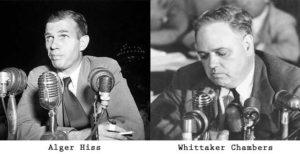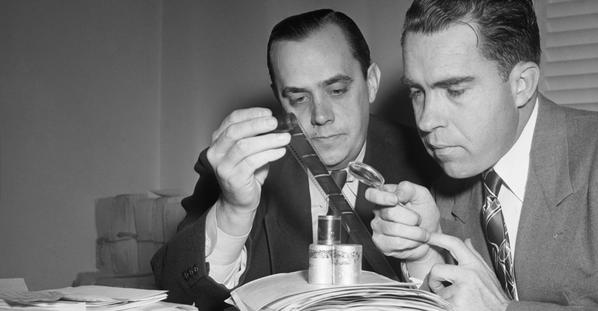Podcast: Play in new window | Download (Duration: 58:00 — 43.8MB)

Tricky Dick started out that way…
Today’s show is about knowing and believing. And our key players are Alger Hiss, Richard Nixon, and Whittaker Chambers. Behind the scenes lurks the military industrial complex as fronted by the Dulles brothers, in particular John Foster, and corporate collaboration with Hitler’s Third Reich. But there is also in this story the justified fear of being hounded and jailed for the crime of being homosexual (yes, it was illegal) and for supporting civil rights for black Americans.
 My guest via Skype from London is Joan Brady, a noted author of suspense fiction, who has recently published the book, Alger Hiss: Framed–A New Look at the Case That Made Nixon Famous. Brady met Hiss and was a casual acquaintance from 1960 on. Her book hinges on the two hours of “off-the-record” testimony given by Chambers to HUAC and orchestrated by Nixon on August 7, 1948.
My guest via Skype from London is Joan Brady, a noted author of suspense fiction, who has recently published the book, Alger Hiss: Framed–A New Look at the Case That Made Nixon Famous. Brady met Hiss and was a casual acquaintance from 1960 on. Her book hinges on the two hours of “off-the-record” testimony given by Chambers to HUAC and orchestrated by Nixon on August 7, 1948.
The conviction of Alger Hiss for perjury in 1950, continues to define the terms of what it means to American. But the definition seems always professed in the negative–anti-communist most insistently through the 20th century, and now anti-Islam. To be American is to be strongly NOT something else.
The “Trial of the Century” was a rather public beginning to a continuing age of the politics of fear and paranoia. And it was the beginning of the political career of Richard Milhous Nixon–a Red-baiting genius who played every hand to win regardless of the circumstance. And as an accomplished poker player he was The King of the Bluff. Nixon went all-in on Hiss with one card, the phantasmagoric and ever-changing quote unquote witness testimony of Whittaker Chambers.
Eliot Weinberger wrote of Chambers (“A Spook in the House of Poetry“)
After brief service as the editor of The New Masses, Chambers left literature in 1932 to join a society even more obscure and elite than those of poetry, Party, and unspoken sexuality: the Fourth Section of Soviet Military Intelligence. He was never again a poet; as a spy he seems to have done little of importance.
In 1948 he enters history and legend, almost a figure of the contemporary existential fiction: the distasteful martyr, the outcast messenger bearing – depending on the auditor – false or bad news. His darkly motivated tales of pumpkins and rugs have never been explained. Only their effect is known: they destroyed the government career of one ambitious young man, Alger Hiss, and launched another, Richard Nixon.
RELATED
Joan Brady: Alger Hiss ‘was framed by Nixon’
“Venona and Alger Hiss” by John Lowenthal, from Intelligence and National Security, Vol. 15, No. 3 (Autumn 2000)
The GOP insisted Whittaker Chambers’ pumpkin patch become a historical site (Salon)
MUSIC
“Talking Un-American Blues” by Betty Sanders
“Newspapermen Meet Such Interesting People” by Vern Partlow
“Poor Left Winger” by Janet Greene
“I’m No Communist” by Carson Robison
“The Ballad of Richard Nixon” by Joe Glazer
CREDITS
Producer & Host: Doug Storm
Assistant Producer: Rob Schoon
Studio Engineer: Bryce Martin
Executive Producer: Wes Martin
 WFHB Bloomington Community Radio
WFHB Bloomington Community Radio


